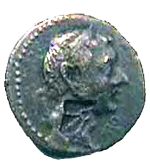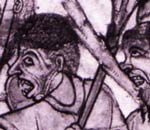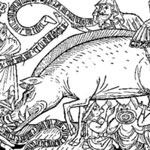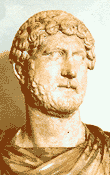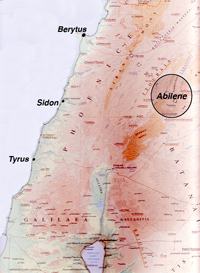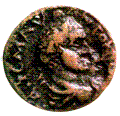Nothing like St Luke
Luke - Inferred authorship
"Ancient church tradition attributed the third gospel to Luke ... Most modern commentators are skeptical ... They regard the tradition as based largely on inferences from the text of the New Testament made when people were first beginning to wonder who had written the Gospels."
– Joseph Fitzmyer, The Oxford Companion to the Bible, p470.
Creative biography from the 2nd century
"The holy Luke is an Antiochene, Syrian by race, physician by trade. As his writings indicate, of the Greek speech he was not ignorant. He was a disciple of the apostles, and afterward followed Paul until his confession, serving the Lord undistractedly, for he neither had any wife nor procreated sons. Of eighty-four years, he slept in Thebes, the metropolis of Boeotia, full of the holy spirit."
– Anti-Marcionite Prologue to the Gospel of Luke..
Forgery?
"It is very significant, for the date of the authorship of Luke, to note the fact that the only Theophilus known to early Church history is a certain ex-Pagan by that name, who, after becoming Christian, and very probably before being instructed in the certainty of the faith by "Luke," himself turned Christian instructor and Father, and wrote the Tract, in three Books, under the title Epistle to Antolychus, preserved in the Collection of Ante-Niacin Fathers, vol. 2: pp. 89-121.
This Theophilus became Bishop of Antioch about 169-177 AD and thus illuminates the date of Luke."
– Joseph Wheless (Forgery In Christianity)
The real Lysanias – executed by Mark Antony in 36 BC for collusion with the Parthians. His tiny kingdom was presented by Antony to Cleopatra.
After the triumph of Augustus what remained of the "tetrarchy" (essentially the town of Abila) passed to Zenodorus, the son of Lysanias.
But Zeno' did not hold the town for long. His "robbers' nest" was cleared out by Varro, the governor of Syria, and presented by Augustus to Herod (Josephus, War, 1.20). Abila subsequently passed to Herod's son Philip (War 2.6.3) and then his grandson Agrippa (Antiquities, 20.7).
Apologists, desperate to preserve the veracity of Luke, seize upon a dubious inscription found near Damascus a century ago, to insist that there must have been a "second Lysanias" otherwise unknown to history.
More empty tombs – Jerusalem resting place of Queen Helena of Adiabene.
No Evidence
"There is no evidence outside the Bible that Jesus was really born in Bethlehem at all … Neither John's Gospel nor Mark's Gospel mentions it, and St Paul does not seem to know about it either."
– Mark Tully (Lives of Jesus, p62)
Copied
"The parable of the Rich Man and Lazarus was an adaptation of an Egyptian folktale which had become very popular with the Jews."
– Michael Grant (Jesus, p59)
Stretching a point
" Luke stretches the story further in both directions.
The account of the birth of Jesus is preceded by that of John the Baptist and the childhood section is followed by an anecdote about Jesus as a twelve-year old youth.
At the other end, we find a canvas, more detailed than that in Matthew, of resurrection and repeated apparitions of Christ, crowned by a statement concerning his ascension to heaven."
– Geza Vermes (The Changing Faces of Jesus, p161)
Anti-Semite?
The picture of Jesus in the Greek Gospels, eating with tax-collectors, lampooning the traditions of his people, welcoming sinners and ridiculing Torah piety are all expressions of Gentile anti-Judaism.
Only Gentiles utterly without sympathy to Judaism could profess to see such a Jesus as a noble pioneer of a "higher righteousness."
The Lutheran theologian Norman Beck has documented more than 450 anti-Semitic verses in the Bible.
Jewish-Christian Relations website.
Caricatured Jews – 12th century Winchester Psalter
Jew-bashing
The messianic war against Rome is correctly understood as a desperate resistance to imperial exploitation.
The Christians concocted the self-serving notion that "Jerusalem fell because her people had rejected the messiah."
It was a deadly misconception.
Jews suckle from Devil's Pig!
Christian propaganda, 15th century Germany
Roman Governors of Syria
Sentius Saturninus 9 - 6 BC
Quintilius Varus 6 - 4 BC
(conducted a war against the Homandenses, a tribe in the Taurus Mountains and suppressed a rebellion in Jerusalem in 4 BC.
3 BC - 6 AD ?
Sulpicius Quirinius 6 – 12 ADCaecilius Silonus 12 - 15 AD
Valerius Gratus 15 - 18 AD
A Tax Too Far
Josephus actually tells us the tax value of Antipas's territory. It was worth a revenue of "two hundred talents." (War 2.6.3). He also tells us what Caesar Augustus decreed: "a fourth part of that tribute." (Antiquities 17.11.4)
Despite what Luke says (2.1,5), no one in Galilee between 4 BC and 39 AD would have needed to traipse "over the border" to Bethlehem (south of Jerusalem) to pay a poll tax.
Between 4 BC and 6 AD Bethlehem was in Archelaus's bailiwick; and after 6 AD it was in a Roman province administered from Caesarea.
"The worshipers of Serapis are called Christians, and those who are devoted to the god Serapis, call themselves Bishops of Christ."
–Hadrian to Servianus, 134 AD.
Who on earth was Luke? The earliest evidence of the name "Luke" associated with any gospel is the so-called Muratorian fragment, dated to around 170 AD. But who on earth was Luke? Certainly not one of "the twelve" or even a minor player with a walk-on part in the Jesus melodrama. In the entire New Testament there are only three passing mentions to a character called Luke – and all appear in Pauline epistles deemed "inauthentic" by many scholars.
The saint is said to have died a natural death at Thebes in Greece, at the age of 84 (no glorious martyrdom for this guy!) Then again, a 14th century Byzantine history reports he was hanged from an olive tree (a glorious martyrdom after all!) Apparently, emperor Constantius, one of the sons of Constantine, had Luke's miracle-working bones transported to Constantinople, only to be stolen by Crusaders of the 4th Crusade. Skeletal remains landed up at Padova in Italy and (sans skull and a rib) are still there, in the church of Santa Justina – though claimed by the Metropolitan of Thebes. In Thebes an impressive Roman tomb from the 2nd century BC has been sequestered for the (missing) apostle – but even the empty tomb works miracles. Bless!
Devil in the detail
The 15th year of Tiberius is clear enough – 28/29 AD. We know Pilate was procurator at this time (26-36) and Antipas certainly was tetrarch of Galilee (4 BC - 34 AD). But who on earth was "Lysanias tetrarch of Abilene"? Abilene was an area of barely 50 square miles – in Syria. In "the 15th year" it was the most northerly part of the tetrarchy of Herod's son Philip, infamous for its bandits and little else. There had once been a local ruler called Lysanias – but he had been killed by Marc Antony as a sop to Cleopatra more than half a century earlier. (Josephus, Antiquities 15.4.1). Having got the wrong monarch, why does Luke mention such the obscure and tiny fief anyway, quite irrelevant to the saga he is about to tell (unless, that is, he's cribbing from someone else's text?). Just maybe Luke confused Abilene with Adiabene, which for about a century ending in 115 AD was an important Jewish Kingdom in Mesopotamia, roughly corresponding with ancient Armenia. Its capital was Arbela (today's Irbil, in the Kurdish region of Iraq). Though 600 miles from Jerusalem that kingdom played a significant role in 1st century events in Judaea. The queen of Adiabene, Helena, shipped food to Jerusalem to relieve the famine which occurred in the time of Emperor Claudius. Josephus wrote that Grapte, a relation of Izates, king of Adiabene, built a palace in the city (Wars 4.9.11) and that Helena had another palace of her own (Wars 5.6.1). During the Jewish war against Rome of 66-70 the Adiabene royal family supported the Judaean side and tombs of the Adiabene monarchs are to be seen in Jerusalem today. Did Luke confuse Abilene with Adiabene? Easily done in the chaotic early decades of the 2nd century. But then it is only a story.
Benign PaganismHadrian’s long and enlightened reign ended with his death in 138 AD, followed by the capable emperor Antoninus (the ‘pious’, for his fidelity to the traditions of Rome) and Marcus Aurelius, the ‘philosopher emperor.’ The dynasty itself ended with the murder of Commodus, the unhinged son of Marcus Aurelius. A year of civil war was settled by the elevation of a strong man from the Danubian front, Septimius Severus. His sons Geta and Caracalla followed him on the throne. The reign of these Antonine/Severan princes marked the high point for the peace, prosperity and religious toleration of the Roman world. The Empire was a military despotism yet almost all beliefs were tolerated and indulged – a liberality which Edward Gibbon describes as the ‘mild indifference of antiquity.’ In this Golden Age of the ancient world, there was no economic basis for either the Greeks or the Romans to envy the Jews, nor did they. Rather, they despised those who called themselves Jews for their unwillingness to join the world culture which self-evidently bestowed its beneficence on humanity. Neither were Greeks or Romans racist in the modern sense of the word. Rome stood aloof, for the most part contemptuous of ‘oriental cults’ and moving against them only when they appeared to threaten public order. There were no ‘holy wars’ in antiquity, no ‘ethnic cleansing.’ And for all their distaste and suspicion, a succession of Roman emperors protected the Jews, preserved their traditions , and accorded them special privileges. Simply, there was never any widespread persecution of the Jews under pagan rule. It was under the benign rule of Rome’s ‘pagan’ emperors that the intrinsically intolerant cult of Christianity was able to coalesce, become organised and, ultimately, to seduce the Roman state.
|
||||||||||||||||||||||||||||||||||||||||||||||||||||||||||||
|
First Recorded Words of the Godman
"And it came to pass, that after three days they found him in the temple, sitting in the midst of the doctors, both hearing them, and asking them questions.
And all that heard him were astonished at his understanding and answers. ... And he said unto them, How is it that ye sought me? wist ye not that I must be about my Father's business?"– Luke 2.46,48.
This story
of the discussion with the doctors in the Temple – the only episode
dreamed up to fill the void between the fanciful birth and the
fabricated 'ministry' – is proved to be mythical by all
the circumstances that surround it.
The statement that his mother and father left Jerusalem, believing that he was with them; that they went a day's journey before discovering that he was not in their company; and that after searching for three days, they found him in the Temple asking and answering questions of the learned Doctors, involves a series of tremendous improbabilities. On the other hand, Josephus provides a plausible source for the tall story – an anecdote in his biography!
In this, the prototype for a future ‘Luke’s gospel’, the resurrection was also embellished with telling extra detail - not bad, a lifetime after the supposed event and two devastating wars!
In more energetic terms than ever the author absolved Rome from any responsibility for the godman’s death and blamed the perfidious Jews. Indeed, what makes it clear that the author is a non-Jew are the ‘glaring errors in “things Jewish.”’ (Meier, A Marginal Jew, p210) This is especially so, where the writer of Luke confuses two distinct rituals – the purification of the mother and the redemption of the firstborn male.
Post-war, in the revised doctrines of the gentile Christians and apostate Jews, it was the ‘hard heartedness’ of the Jews – in rejecting Christ’s message –which had cost them god’s patronage. This, then, was the explanation for the terrible wars and their outcome.
Both Philo and Josephus – Jewish historians – had said that the god of the Jews was now acting through the hand of Rome. Zealous Christians took the idea further. They postulated that ‘the mission’ had passed on to a new generation of evangelists - gentiles, like themselves. The Jews, far from being a chosen people, were now pariahs; they had had their chance and had blown it.
The
Poisoned Chalice –
The Early Christians invent
Anti-Semitism
In a terrible irony, the religious intolerance devised by the Jews themselves was passed on to the early Christians, who turned such sentiments back upon the Jews with a vengeance.
Shamelessly commandeering Jewish scripture for their own use, and dissembling their own novelty by laying claim to ancient Jewish antecedents (the ‘New Israel’), the Christians were at pains to make clear they were not mere heretical Jews. It was in the brief interval when the Roman state perceived them precisely as a renegade sect that the Christians lost the protection of Roman law.
To redeem themselves, the Christians revised their sacred texts to reflect an exoneration of the Romans and a damnation of the Jews. As a crucial part of their self-identification, the Christ–followers likened the Jewish faith to a fallen world of darkness, demonized the Jews as a people, and castigated and condemned them as Christ-killers. Anti-Semitism was born – in the Bible.
The first step in this demonizing process was to fabricate stories that the Jews ‘had not listened’ to the humanoid Christ-figure. In what was to become Luke’s Gospel, the bogus notion was floated that Christianity – as an entirely new religion, separate doctrinally and ethnically from Judaism – had sprung into existence about the year 30 AD!
The
Curse of Stephen
In Acts of the Apostles, generally assumed to be by the same author as Luke, the expression ‘the Jews’, redolent with hostility and distaste, appears after Saul arrives on the scene. Acts 6 introduces the angelic-faced 'Stephen', a man ‘full of faith and power’. He is apparently one of seven new administrators of the church (what a coincidence, Rome itself was being divided into seven diaconates at this time!)
His purpose is rather less than angelic. In an amazingly long speech in Acts 7 Stephen, standing before the Sanhedrin, summarizes the whole of Jewish history and Old Testament teachings (the "speech" is actually lifted from Joshua 24) – and claims that the Jews had always been apostate, since the time of Moses himself!
The neglected
Law had now lost its relevance because it had been fulfilled
in Christ. Stephen then delivers his ominous charge: the
Jews had killed Christ, just as their ancestors had
killed the prophets.
'Which of the prophets have not your fathers persecuted? and they have slain them which shewed before of the coming of the Just One; of whom ye have been now the betrayers and murderers: Who have received the law by the disposition of angels, and have not kept it.' – Acts 7.52-5.
Having
served his lethal theological purpose Stephen is quickly disposed
of. It seems that the enraged council, having ‘gnashed
at him with their teeth’ (Acts 7:54), had him dragged
out and stoned to death (no ruling from Pontius Pilate needed
for this guy!)
Marcion Severs Jewish Roots
A draft of the early proto-Luke reached the hands of a bishop – himself the son of a bishop who claimed to have known Paul – and in consequence enjoyed immense prestige. This was Marcion, one of the earliest ‘Catholics’ to address the issue of a ‘defined gospel'.
A wealthy ship owner from Sinope (modern Sinop, on the Turkish Black Sea coast), Marcion had helped fund the bishopric of Rome. While residing in the imperial capital Marcion revised ‘proto-Luke’ and published (about 140) the first ‘new testament’ (the term itself was not used until the early third century), calling it simply ‘Evangelicon’ (or ‘Gospel of the Lord’ ), a slim, single volume, to which he appended ten of Paul’s epistles (the ‘Apostolicon’’).
Marcion rejected all other scripture, including Jewish scripture in its entirety, arguing that Yahweh was a cruel god, completely separate from the loving god spoken of by Paul. Thus for Marcion there were two gods, the lesser of which was Yahweh, the creator god. The loving god’s "Grace" would replace "The Law " of the harsh god. The body must die, said Marcion. Only the soul would be resurrected. The flesh had to be overcome by the spirit, or loving god, revealed in Christ.
In this gospel (which Marcion attributed to Paul himself), there is no nativity, no baptism.
Marcion’s Christ descends fully grown from heaven (as had a number of Greek gods), and appears suddenly in a synagogue in Capernaum. In other respects his text follows closely the wording which would eventually be found in Luke.
Marcion preached and evangelised for more than twenty years. But he fell out with his acolytes in Rome and returned to Asia Minor to establish his own church hierarchy. Marcionites were soon to be found throughout the Roman Empire. In the east, this particular Christianity thrived for centuries and survived into the early Middle Ages.
Church or The Kingdom?
In practical
terms, the diverse Christians retrenched, a minority still filled
with hope for an imminent ‘Day of the Lord’,
but others feeling their way towards an established Church.
What the Christians lacked in original doctrine they made up for in astute
organisation. Borrowing freely from Jewish precedents, the Christians set
up ‘prayer houses’ to rival synagogues, appointed priests
to read approved texts, and collected money and property to serve the
faith. Their cult had survived the wars by embracing, not opposing, authority
and now it demanded of its converts discipline and compliance.
Judaism had been rent and fatally weakened by its divisions; in their
plans for a ‘Universal Church’ the Christians would have no
place for dissent. Ironically, this striving for monolithic organisation
would ensure factionalism and ‘heresy’ for centuries.
As the largest city in the region, and the home of the largest community of displaced Jews, Alexandria, became the leading centre for an organised Christian church. The city that, in the work of Philo, had already contributed the notion of ‘Logos’, now gave the world the first recognisable ‘Christianity.’ It was in Alexandria that some of the most notable church ‘fathers’ would pontificate. It was from Alexandria that some of the most important Christian heresies would originate. And it was in Alexandria that some of the worse excesses of Christian terrorism were perpetrated.
Correspondence of Emperor Hadrian
refers to Alexandrian worshippers of the sun-god Serapis
calling themselves ‘Bishops of Christ’:
"Egypt, which you commended to me, my dearest Servianus, I have found to be wholly fickle and inconsistent, and continually wafted about by every breath of fame. The worshippers of Serapis are called Christians, and those who are devoted to the god Serapis, call themselves Bishops of Christ."
– Hadrian to Servianus, 134 AD (Quoted by Giles, Hebrew and Christian Records, vol. ii, p86, 1877)
The reference
is intriguing. In the cult of Serapis, Graeco-Roman and Pharaonic
religion had already mingled. The cult of
Lord Serapis was of comparatively recent origin, having been
established by the former general of Alexander, Ptolemy I Soter
(304 - 284 BC). His new god (a transliteration, via Zaparrus,
of Asar-Hapi) had replaced the more ancient linked Egyptian gods
Osirus and Apis and formed part of an Egyptian trinity shared
with Isis (the Mother!) and Horus (the Divine Child!).
Ptolemy’s idea was to have a unifying, national god, worshipped by all his subjects. Accordingly, Serapis had been given characteristics drawn from both Egyptian and Greek deities. The child Horus, it should be noted, was held to have been born in a stable on December 25th and the mother, Isis, to have been a virgin! For the Egyptians, Horus had been a god of the underworld and judge of the dead. One of the many titles that would be given to Christ was Judge ... that celestial arbiter on the day of judgement!
That the syncretic process should have continued with the additional fusion of the Jewish godman legend is no more than we would expect – and the result was Christian scripture!
|
|||||||
Sources:
Paul Johnson, A History of the Jews (Phoenix Grant,
1987)
Dan Cohn-Sherbok, The Crucified Jew (Harper Collins,1992)
Henry Hart Milman, The History of the Jews (Everyman, 1939)
Josephus, The Jewish War (Penguin, 1959)
Leslie Houlden (Ed.), Judaism & Christianity (Routledge, 1988)
Karen Armstrong, A History of Jerusalem (Harper Collins. 1999)
Jonathan N. Tubb, Canaanites (British Museum Press, 1998)
Norman Cantor, The Sacred Chain - A History of the Jews (Harper
Collins, 1994)
|
||||||||||||||||||||||||||||||||||||||||
|
|
|
||
Copyright © 2004
by Kenneth Humphreys.
Copying is freely permitted, provided credit is given to the author and
no material herein is sold for profit.

